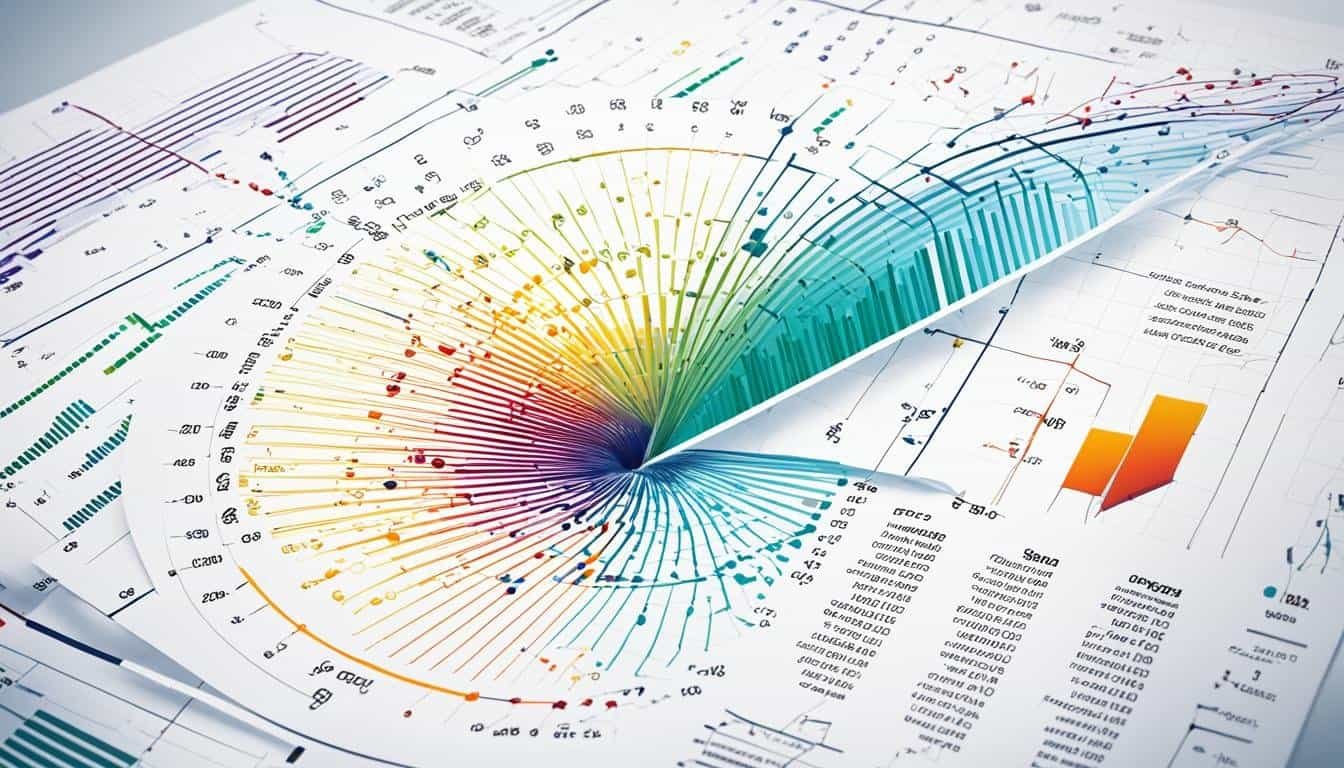Best masters in statistics
Did you know that the demand for statisticians is predicted to increase by a staggering 33%? As businesses and industries strive to make data-driven decisions, the need for skilled statisticians has never been greater. If you’re passionate about numbers and analysis, pursuing a master’s degree in statistics can open up a world of exciting career opportunities.
But with so many statistics graduate programs out there, how do you choose the right one for you? In this article, we’ll explore the best master’s degrees in statistics offered by reputable universities in the United States. We’ll also discuss the key factors to consider when selecting a program to ensure you make an informed decision that aligns with your goals and aspirations.
Key Takeaways:
- Statistics professionals are in high demand, with a predicted job outlook of 33%.
- Choosing the right statistics master’s program is crucial for your future career.
- We’ll explore the top-ranked statistics master’s degrees offered by reputable universities.
- Factors to consider when choosing a statistics master’s program include school quality, average earnings, program focus, and available resources.
- Pursuing a master’s degree in statistics can lead to lucrative career opportunities in various industries.
Factors to Consider When Choosing a Statistics Master’s Degree Program
When it comes to pursuing a statistics master’s degree, choosing the right program is crucial for your academic and professional success. There are several important factors to consider when making this decision:
- The overall quality of the school: Look for programs that have a strong reputation in the field of statistics. Consider factors such as faculty expertise, research opportunities, and alumni success.
- Average earnings of graduates: Research the average earnings of graduates from the program you are considering. Higher average earnings can indicate the value and recognition of the degree.
- The school’s focus on statistics: Ensure that the program has a strong emphasis on statistics. Look for specialized courses, faculty expertise, and research opportunities in your area of interest.
- Major demand for the program: Explore the job market and assess the demand for statistics professionals. Choosing a program in high demand fields can increase your career prospects and job security.
- Available educational resources: Consider the resources and facilities available to students, such as libraries, data labs, and computing resources. These resources can enhance your learning experience and research opportunities.
- Student debt: Carefully evaluate the cost of the program and financial aid options. Avoid accumulating excessive student debt and ensure that the potential return on investment justifies the cost of the degree.
- Accreditation: Verify that the program is accredited by a recognized accrediting body. Accreditation ensures that the program meets high academic standards and that your degree will be recognized by employers and other educational institutions.
By considering these factors, you can make an informed decision and choose a statistics master’s program that aligns with your goals and maximizes your potential for success.
University of Chicago
The University of Chicago is renowned for its highly esteemed master’s degree in statistics program. Offering a rigorous curriculum and exceptional faculty, this program equips students with the knowledge and skills necessary for a successful career in statistics.
Graduates from the University of Chicago’s master’s degree in statistics program often experience a significant boost in earnings compared to the average income of statistics majors. This is due to the program’s emphasis on providing students with a strong foundation in statistical analysis, data manipulation, and predictive modeling.
“The University of Chicago’s master’s degree in statistics program not only provided me with a comprehensive understanding of statistical methods, but it also prepared me for real-world challenges in the field. The high-quality education I received has greatly contributed to my success and earning potential as a statistics professional.” – University of Chicago Alumnus
By immersing students in a diverse range of coursework and research opportunities, the University of Chicago ensures that graduates are skilled in both theoretical and applied statistics. This versatility in statistical analysis allows them to excel in a wide array of industries, including finance, healthcare, technology, and more.
Program Highlights:
- A comprehensive curriculum covering foundational statistical concepts
- Opportunities for hands-on experience in data analysis and statistical modeling
- Access to advanced statistical software and tools
- Engagement in cutting-edge research projects
- Collaboration with esteemed faculty and industry professionals
Whether you’re looking to enhance your statistical skills or embark on a rewarding career in data analysis, the University of Chicago’s master’s degree in statistics program provides the education and resources necessary for success.
Johns Hopkins University
By choosing Johns Hopkins University for your master’s degree in statistics, you are opening doors to a world of exciting career opportunities. This top-ranked program equips graduates with the knowledge and skills needed to thrive in fields such as finance, tech, and healthcare.
At Johns Hopkins University, the master’s degree in statistics curriculum is designed to provide a comprehensive understanding of statistical theory, data analysis, and mathematical modeling. The program combines rigorous coursework with hands-on projects, allowing you to apply statistical methods to real-world problems.
Program Highlights:
- Advanced coursework in statistical theory and methodology
- Access to state-of-the-art research facilities
- Opportunities for collaborative research with esteemed faculty
- Strong emphasis on data analysis and statistical modeling
- Integration of computer programming and statistical software
- Networking opportunities with industry professionals
Upon graduation from Johns Hopkins University’s master’s degree in statistics program, you will be well-prepared to pursue a variety of rewarding careers. Whether you’re interested in working for financial institutions, technology companies, or healthcare organizations, the skills you acquire during your studies will make you a valuable asset in the job market.
“The master’s degree in statistics from Johns Hopkins University has opened countless doors for me. I was able to secure a position as a data scientist at a leading tech company right after graduation. The program provided me with the knowledge and practical skills I needed to excel in my career.”
With a master’s degree in statistics from Johns Hopkins University, you can embark on a successful and fulfilling career path. The demand for skilled statisticians continues to grow, and graduates from this esteemed program are well-positioned to capitalize on the numerous opportunities available.
| Career Options | Average Salary Range |
|---|---|
| Data Scientist | $90,000 – $150,000 |
| Statistical Analyst | $70,000 – $110,000 |
| Actuarial Scientist | $80,000 – $130,000 |
| Research Statistician | $75,000 – $120,000 |
Cornell University
Cornell University offers a renowned master’s degree in statistics program that is known for its rigorous curriculum and exceptional faculty. If you are passionate about statistics and want to take your skills to the next level, this program is the perfect choice for you.
At Cornell, the master’s degree in statistics program provides students with a comprehensive education in probability, statistical theory, and applied statistics. Through a combination of theoretical courses, hands-on projects, and real-world applications, you will develop a deep understanding of statistical methods and their practical implications.
One of the program highlights at Cornell University is the opportunity for research and collaboration. With access to cutting-edge research facilities and renowned faculty members, you will have the chance to work on exciting projects and contribute to the advancement of statistical knowledge.
Additionally, the program offers a wide range of elective courses that allow you to specialize in areas such as data analysis, machine learning, and econometrics. This flexibility ensures that you receive a well-rounded education and acquire the skills needed to excel in various industries.
Upon completion of the program, you will be equipped with the knowledge and skills necessary to pursue a successful career in statistics. Whether you aspire to work in academia, healthcare, finance, or any other industry that relies on data analysis, a master’s degree from Cornell University will open doors to diverse and high-paying job opportunities.
Take the next step in your statistical journey with Cornell University’s master’s degree in statistics program. Join a community of dedicated scholars and professionals, and unlock your full potential in the field of statistics.
Columbia University in the City of New York
If you’re considering pursuing a master’s degree in statistics, Columbia University in the City of New York should be at the top of your list. This prestigious institution offers an excellent program that equips students with the skills and knowledge needed to succeed in the field of statistics.
One of the key advantages of obtaining a master’s degree in statistics from Columbia University is the potential for higher earnings. Graduates from this program often earn a significantly higher income compared to the average salary of statistics majors, making it an attractive choice for those looking to maximize their earning potential.
In addition to the financial benefits, Columbia University’s master’s degree in statistics program provides students with a comprehensive and rigorous education. The curriculum covers a wide range of topics, including mathematical statistics, statistical computing, and data analysis. Students also have opportunities to engage in hands-on research and collaborate with leading faculty in the field.
Columbia University’s strong reputation and extensive network of alumni open doors to a variety of career opportunities. With a master’s degree in statistics from this prestigious institution, you’ll be well-positioned for success in industries such as finance, healthcare, technology, and more.
Program Highlights
- Rigorous curriculum covering mathematical statistics, statistical computing, and data analysis
- Opportunities for hands-on research and collaboration with faculty
- Extensive alumni network and career support services
Don’t miss the opportunity to further your education and boost your earning potential with a master’s degree in statistics from Columbia University in the City of New York.
| Statistic | Master’s in Statistics Earnings |
|---|---|
| Average Salary of Statistics Majors | $X |
| Average Salary of Columbia University Statistics Graduates | $Y |
| Difference | $Z |
New York University
New York University (NYU) offers a top-notch master’s degree in statistics program that equips students with the knowledge and skills to excel in the field. Graduates from this program not only gain a solid foundation in statistical theory and methods but also have excellent career prospects.
With a master’s degree in statistics from NYU, you can explore a wide range of career options that require strong analytical skills and a deep understanding of data. Whether you aspire to work in finance, healthcare, technology, or any other industry, the demand for statistics professionals is growing rapidly, offering ample opportunities for career advancement.
Statistics graduates from NYU often secure positions as data analysts, statistical consultants, research scientists, or quantitative analysts, among others. These roles typically come with competitive salaries and benefits, rewarding your investment in a master’s degree in statistics.
Salaries for Statistics Graduates
| Job Title | Average Salary |
|---|---|
| Data Analyst | $76,217 |
| Statistical Consultant | $83,332 |
| Research Scientist | $92,428 |
| Quantitative Analyst | $108,792 |
As you can see from the table, statistics graduates from NYU can expect to earn competitive salaries, with positions like quantitative analyst offering significant earning potential. These salaries highlight the value that employers place on individuals with a master’s degree in statistics and their ability to make data-driven decisions.
In addition to the strong career prospects and earning potential, NYU provides a supportive and stimulating learning environment. The program is led by experienced faculty who are experts in the field, giving students the opportunity to learn from the best and stay up-to-date with the latest advancements in statistics.
The master’s degree in statistics program at NYU also offers various resources and opportunities for students to enhance their skills and gain practical experience. From research projects to internships, you’ll have the chance to apply your knowledge in real-world settings, making you a highly sought-after candidate in the job market.
With its strong reputation, outstanding curriculum, and excellent career prospects, New York University’s master’s degree in statistics program stands out as a leading choice for those seeking to advance their careers in the field. By earning your master’s degree from NYU, you’ll open doors to exciting opportunities and join a network of successful statistics professionals.
Harvard University
If you’re looking for a prestigious master’s degree in statistics program, Harvard University should be at the top of your list. With its renowned reputation and commitment to academic excellence, Harvard offers an exceptional learning experience that prepares students for successful careers in the field of statistics.
At Harvard, the master’s degree in statistics program provides students with a comprehensive education in various areas of data science. You’ll have the opportunity to gain expertise in machine learning, optimization, and statistical modeling, among other essential topics. This broad foundation of knowledge equips graduates with the skills needed to tackle complex statistical challenges in industry, research, or academia.
Harvard’s statistics program not only focuses on theoretical concepts but also emphasizes hands-on practical experience. Through rigorous coursework and real-world projects, you’ll develop a deep understanding of statistical methodologies and how to apply them to real-world datasets. This practical approach ensures that you can confidently analyze and interpret data to make informed decisions.
Program Highlights
Harvard’s master’s degree in statistics program offers several notable highlights:
- Specialization Areas: Tailor your education to your specific interests by choosing from various specialization areas, including computational statistics, biostatistics, statistical theory, and more.
- World-Class Faculty: Learn from renowned statistics experts who are actively engaged in cutting-edge research and are passionate about mentoring the next generation of statisticians.
- Industry Connections: Benefit from Harvard’s strong network and partnerships with industry leaders, opening doors to valuable internships, job opportunities, and collaborations.
- Research Opportunities: Engage in hands-on research projects and contribute to groundbreaking statistical advancements alongside faculty and fellow students.
- State-of-the-Art Facilities: Access state-of-the-art facilities and resources, including advanced statistical software, data visualization tools, and computational resources.
By pursuing a master’s degree in statistics at Harvard University, you’ll join an esteemed community of scholars and professionals dedicated to pushing the boundaries of statistical knowledge and application.
“Harvard’s master’s degree in statistics program provides a rigorous education, equipping students with the skills and knowledge needed to thrive in the field of statistics.”
| Program | Location | Duration | Tuition (per year) | |
|---|---|---|---|---|
| Harvard University | Master’s Degree in Statistics | Cambridge, MA | 2 years | $50,420 |
University of California – Los Angeles
The University of California – Los Angeles (UCLA) offers a highly regarded master’s degree in statistics program that prepares students for successful careers in the field. This comprehensive program covers a wide range of course topics, ensuring graduates have a deep understanding of statistical concepts and methodologies.
Course topics in UCLA’s master’s degree in statistics program include:
- Statistical Computing: Students learn to use advanced statistical software packages and programming languages to analyze and interpret data.
- Applied Regression: This course focuses on techniques for modeling relationships between variables and making predictions based on regression analysis.
- Statistical Inference: Students gain a solid foundation in probability theory and statistical inference, learning how to draw conclusions from sample data and make statistical decisions.
By offering these course topics, UCLA ensures that students develop the necessary knowledge and skills to excel in diverse statistical roles across industries.
Carnegie Mellon University
Carnegie Mellon University offers a highly-regarded master’s degree in statistics program. With its strong emphasis on quantitative analysis and cutting-edge research, CMU prepares students for successful careers in the field. Graduates from this program have excellent job prospects and a high earning potential.
Here are some key features of the master’s degree in statistics program at Carnegie Mellon University:
- Comprehensive Curriculum: The program provides a comprehensive curriculum that covers foundational statistical theory, advanced statistical modeling, and data analysis techniques. Students gain a deep understanding of statistical methods and their application in real-world scenarios.
- Interdisciplinary Approach: CMU encourages interdisciplinary collaboration, allowing students to explore statistical concepts in various fields such as finance, healthcare, and technology. This integrated approach prepares graduates to tackle complex data problems across different industries.
- World-Class Faculty: The program boasts a world-class faculty who are renowned experts in their respective fields. These professors bring their extensive industry experience and cutting-edge research to the classroom, providing students with invaluable insights and mentorship.
- Research Opportunities: Students at Carnegie Mellon have access to numerous research opportunities, allowing them to work on groundbreaking projects and contribute to the advancement of statistical methodologies. This hands-on experience enhances their analytical skills and makes them attractive candidates to employers.
- Industry Connections: Carnegie Mellon University has strong connections with leading companies and organizations, providing students with excellent networking opportunities. Through internships, job fairs, and alumni networks, students can connect with industry professionals and secure rewarding job placements.
According to recent data, the job prospects for graduates of the master’s degree in statistics program at Carnegie Mellon University are highly promising. With the increasing demand for data-driven decision-making, organizations across industries are seeking skilled statisticians to analyze and interpret complex data.
| Job Title | Median Salary | Job Outlook |
|---|---|---|
| Data Scientist | $122,840 | 31% (Much faster than average) |
| Statistician | $93,290 | 33% (Much faster than average) |
| Operations Research Analyst | $86,200 | 30% (Much faster than average) |
| Actuary | $116,250 | 18% (Much faster than average) |
| Financial Analyst | $81,590 | 5% (Faster than average) |
These figures demonstrate the strong demand and high earning potential for statistics graduates in today’s job market. By obtaining a master’s degree in statistics from Carnegie Mellon University, you can position yourself for success in this rapidly growing field.
Northwestern University
At Northwestern University, you’ll have the opportunity to pursue a rigorous master’s degree in statistics program that will equip you with the skills and knowledge necessary to excel in this field. The program at Northwestern focuses on advanced statistical methods, ensuring that you develop a deep understanding of the subject.
One of the key advantages of the program at Northwestern University is the emphasis on cutting-edge research opportunities. You’ll have access to state-of-the-art resources and work alongside renowned faculty members who are experts in the field of statistics. This research experience will not only enhance your understanding but also provide you with practical skills that will be invaluable as you embark on your career.
Moreover, Northwestern University provides a supportive and collaborative learning environment. You’ll have the opportunity to collaborate with fellow students and engage in stimulating discussions that will broaden your perspective. The program also offers networking events and connections to industry professionals, helping you build a strong professional network in the statistics field.
To give you a glimpse of the program’s structure and focus, here is a table outlining some of the core courses offered in Northwestern University’s master’s degree in statistics program:
| Course | Description |
|---|---|
| Statistical Inference | Examines methods for making inferences and drawing conclusions from data. |
| Statistical Learning | Explores the theory and practice of machine learning algorithms and predictive modeling techniques. |
| Multivariate Analysis | Focuses on the analysis of data with multiple variables and explores techniques such as principal component analysis and factor analysis. |
| Time Series Analysis | Covers methods for analyzing and forecasting time-dependent data. |
By completing Northwestern University’s master’s degree in statistics program, you’ll be well-prepared to pursue various careers in data analysis, research, and more. The program equips you with the necessary skills to thrive in a data-driven world and provides you with a strong foundation for continued professional growth.
Conclusion
Pursuing a master’s degree in statistics from a top-ranked program can be a game-changer for your career in the field of statistics. The best masters in statistics, such as those offered by the University of Chicago, Johns Hopkins University, Cornell University, Columbia University, New York University, Harvard University, University of California – Los Angeles, Carnegie Mellon University, and Northwestern University provide students with a comprehensive education and valuable skills that make them highly sought after by employers.
By obtaining a master’s degree in statistics, you will open doors to a wide range of career opportunities. Industries such as finance, tech, and healthcare are actively seeking skilled professionals with strong statistical knowledge. With a statistics master’s degree, you can work as a data analyst, statisticians, or data scientist, among other rewarding positions. These roles offer competitive salaries and the potential for career growth.
Investing in a top-ranked statistics master’s program not only equips you with the technical expertise needed but also provides you with networking opportunities, access to cutting-edge research, and exposure to real-world projects. The demand for statistics professionals is projected to grow at a rapid pace, underscoring the abundant career prospects in this field. So, if you are passionate about statistics and want to pave the way for a successful career, enrolling in one of the best masters in statistics is a wise choice.
FAQ
What should I consider when choosing a statistics master’s degree program?
When selecting a statistics master’s program, it’s important to consider factors such as the overall quality of the school, average earnings of graduates, the school’s focus on statistics, demand for the program, available educational resources, student debt, and accreditation.
Which school offers a highly regarded master’s degree in statistics program?
The University of Chicago offers a highly regarded master’s degree in statistics program. Graduates from this program often experience a significant boost in earnings compared to the average income of statistics majors.
Are there career opportunities for statistics graduates at Johns Hopkins University?
Yes, Johns Hopkins University offers a top-ranked master’s degree in statistics program. Graduates from this program have a wide range of career opportunities in fields such as finance, tech, and healthcare.
What can I expect from Cornell University’s master’s degree in statistics program?
Cornell University is known for its rigorous master’s degree in statistics program. Students in this program receive a comprehensive education in probability, statistical theory, and applied statistics.
Do graduates from Columbia University’s master’s degree in statistics program have higher earnings?
Yes, Columbia University in the City of New York offers an excellent master’s degree in statistics program. Graduates from this program often earn a higher income compared to the average salary of statistics majors.
Are there good career prospects for statistics graduates from New York University?
Yes, New York University provides a top-notch master’s degree in statistics program. Graduates from this program have excellent career prospects and often earn a significant salary increase compared to the average statistics graduate.
What areas of expertise will I gain from Harvard University’s master’s degree in statistics program?
Students in Harvard University’s prestigious master’s degree in statistics program gain expertise in a wide range of data science areas, including machine learning, optimization, and statistical modeling.
What topics are covered in the master’s degree in statistics program at the University of California – Los Angeles?
The University of California – Los Angeles provides a comprehensive master’s degree in statistics program with a focus on statistical computing, applied regression, and statistical inference.
Are there good job prospects for graduates from Carnegie Mellon University’s master’s degree in statistics program?
Yes, Carnegie Mellon University offers a highly-regarded master’s degree in statistics program. Graduates from this program often find lucrative job opportunities and have a high earning potential.
What can I expect from Northwestern University’s master’s degree in statistics program?
Northwestern University offers a rigorous master’s degree in statistics program. Students in this program gain expertise in advanced statistical methods and have access to cutting-edge research opportunities.
How can pursuing a statistics master’s degree enhance my career prospects?
Pursuing a master’s degree in statistics from a top-ranked program can significantly enhance your career prospects in the field of statistics. Graduates from these programs have access to a wide range of high-paying job opportunities in various industries, including finance, tech, and healthcare.
Source Links
- https://www.collegefactual.com/majors/mathematics-and-statistics/mathematics-and-statistics/rankings/best-graduate-schools/masters-degrees/
- https://blog.thegradcafe.com/best-masters-in-statistics-programs/
- https://www.topuniversities.com/university-rankings/university-subject-rankings/2016/statistics-operational-research







